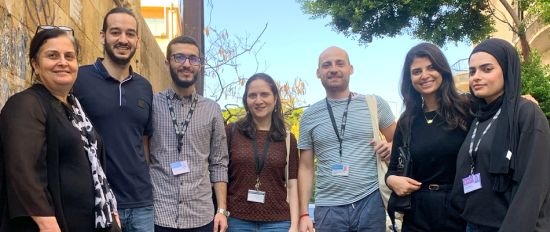
A group of five people carrying light medical equipment leaves the Primary Health Care Center at the Department of Family Medicine building at AUBMC in Ras Beirut. Their destination is a shelter housing displaced individuals from South Lebanon, the Bekaa Valley, and the southern suburb of Beirut. Since the dramatic escalation of the Israeli War on Lebanon in September 2024, and responding to the call of the Ministry of Public Health (MoPH), AUBMC medical teams mobilized to support affected populations, providing medical and psychological care. While their efforts continue today, the intensity has decreased as many displaced families returned to their villages following the November 26 ceasefire.
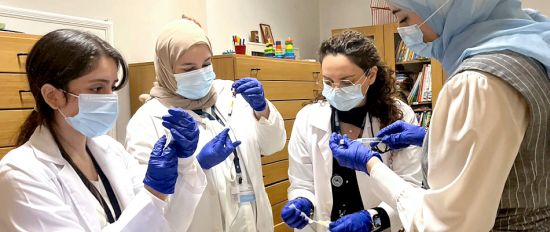
During the worst of the war, doctors, nurses, pharmacists, psychologists, resident doctors, students, experts, and volunteers from AUB and AUBMC joined forces to help those who fled their homes. AUBMC provided support at 10 locations, including schools and residential buildings, all within walking distance. This proximity allowed volunteers to avoid traffic jams and ensured displaced individuals quick access to the Primary Health Care Center in emergencies.
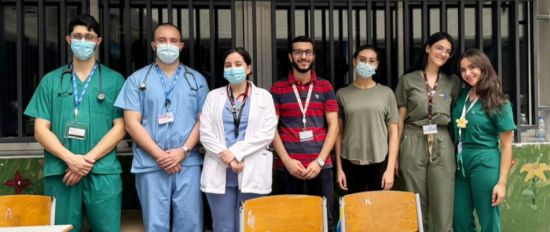
The volunteer teams provided different types of services to the displaced families in the shelters. Mobile clinics to provide medical care for acute and chronic conditions and needed medications. Other visits were allocated to providing vaccines to children, such as the oral polio vaccine (OPV) and measles, mumps and rubella (MMR), as well as the flu vaccine for older adults and those with chronic diseases, as part of the national campaign launched by the MoPH. Volunteers also provided health education sessions and did screenings for chronic diseases and malnutrition. Moreover, some visits were allocated for the provision of psychological support in some of the shelters. Other services included quality of water assessment in shelters, and the distribution of infant milk as needed.
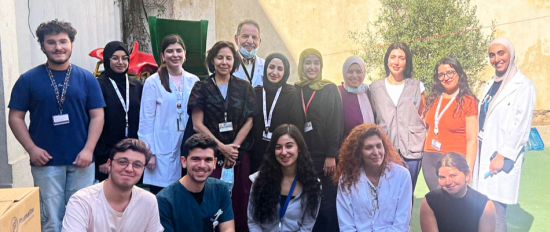
“When we visit shelters, we inform the displaced about the center. Depending on their needs, they can come to us for more comprehensive care, additional investigations, or emergencies," said Dr. Mona Osman, director of the Primary Health Care Center. “In total, nearly 1,800 people received care for acute conditions, chronic conditions such as diabetes, women's health, vaccinations, and medications—whether at the shelters or our center. Additionally, hundreds benefited from awareness sessions on topics like vaccination, women's health, child health, diabetes, and hypertension."
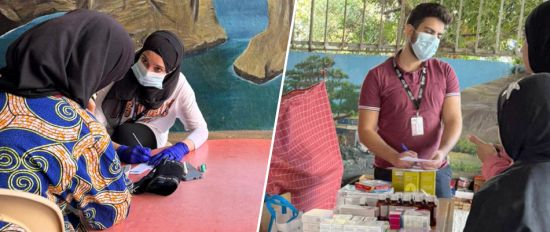
During health awareness and screening days, some displaced urgently needed access to medications they had left behind. AUBMC teams addressed these cases individually, ensuring people received the medicines they needed. The teams also collaborated with NGOs to secure necessary resources, particularly medications that are not covered by the MoPH through Ajialouna Organization, enabling displaced individuals to maintain their health while waiting to return home.
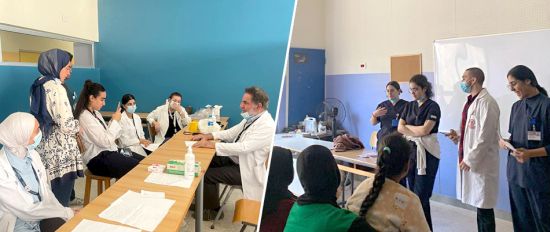
Raffi Thomassian, a family medicine resident at AUBMC who regularly visited shelters, said, “I will become a family medicine specialist soon, and it is part of my humanitarian mission to care for those most in need."
Mental health was also a priority. The Psychiatry Department at AUBMC oversaw two shelters, sending volunteers weekly. Jinan Jana, a clinical psychologist, worked closely with children, organizing activities to help them cope with the situation and rebuild their self-image. “We created fun activities that also supported their emotional wellbeing," she said.
Jana noted that support groups were organized for adults and teenagers as well. “The biggest problem displaced individuals faced daily was overcrowding in schools," she noted. There was also significant latent violence among children.
Charlotte Khalil, a licensed psychologist in the Psychiatry Department at AUBMC, led the psychological support activities for the displaced initiative. Reflecting on her work, Khalil shared a story about a beneficiary named Zeinab, a woman in her 30s who stayed in one of the schools. “Before leaving the school, Zeinab told us she and many other women looked forward to Wednesdays, the day our teams visited. She said, 'We felt that someone genuinely cared for us and was there to listen,'" Khalil recalled. “In situations like these, especially in our society, it's crucial for those affected by tragedies to feel they are not alone. And, through our activities, we aimed to provide that support," Khalil said.
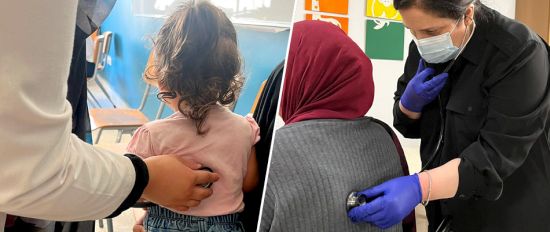
This was a collaborative work among different faculties, departments, and centers at AUB and AUBMC, led by the Primary Health Care Center at the Department of Family Medicine. The Faculty of Medicine, the Hariri School of Nursing, the Faculty of Health Sciences, the Faculty of Agricultural and Food Sciences, the Office of Student Affairs, and the Neighborhood Initiative at AUB all joined forces to provide the care that displaced families needed. Volunteers included faculty members, staff, residents, and students from the different departments and faculties as well as student societies and groups. These included the Department of Family Medicine, Department of Internal Medicine (Division of Endocrinology and Metabolism), Department of Pediatrics and Adolescent Medicine, Department of Obstetrics and Gynecology, Department of Emergency Medicine, Department of Psychiatry, the Hariri School of Nursing, the Nursing Department, the Resident Staff Organization, AUBMCares, AUB Diabetes, Medical Students Society, Premed Student Society, Nursing Student Society, FHS Student Society, and Agriculture Student Society.
AUB and its medical center have always been, and will always be, anchored in the everyday life of the Lebanese capital and the whole of Lebanon. And, with the 2023-24 War on Lebanon, it has continued to uphold its commitment to serving and supporting the country and all its people.